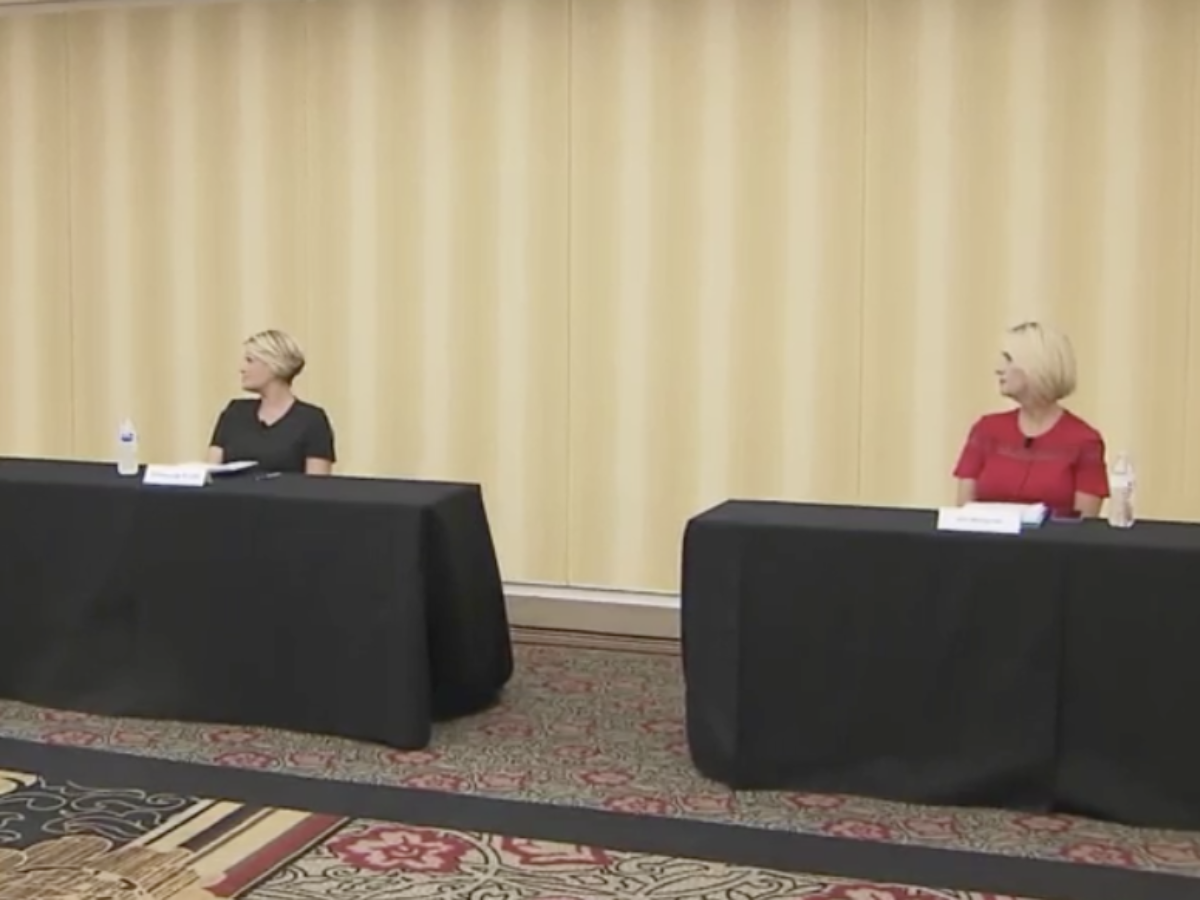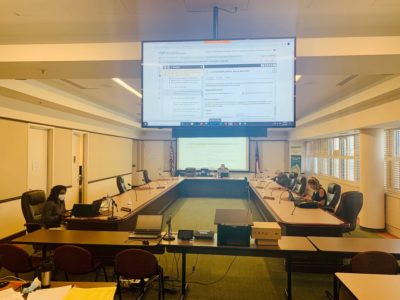

The two candidates for state superintendent of public instruction participated in a forum on Thursday night where they tackled topics ranging from school choice to calendar flexibility.
Democratic candidate Jen Mangrum and Republican Catherine Truitt fielded questions from WRAL Capitol Bureau Chief Laura Leslie and tried to make the case for why they should take over for current superintendent Mark Johnson, a Republican. He declined to run again for his position, and instead ran and lost the Republican primary for lieutenant governor.
The forum, broadcast by WRAL, was put on in partnership with the North Carolina Association of Educators, North Carolina PTA, the North Carolina League of Women Voters, the Public School Forum of North Carolina, and Public Schools First NC.
Here is a look at some of the highlights from the one-hour forum.
Opening statements
Mangrum is a University of North Carolina at Greensboro School of Education associate professor who took on Senate President Pro Tempore Phil Berger, R-Rockingham, in the 2018 election. She is also a former teacher of 14 years and helped create the elementary education program at North Carolina State University’s school of education.
In her opening statement, Mangrum talked about when she was 14 and her mother had a heart attack before school and died in her arms. Mangrum still went to school, because she said she knew that school was a safe and stable place where her teachers would support her.
“Our educators are heroes, and I want to be a champion for them, because I know this is more than just academics,” she said.
Truitt is chancellor of Western Governors University North Carolina, an online university. She has also been a teacher and worked in classrooms for 10 years, served as associate vice president of University and P-12 Partnerships at UNC General Administration, and had the role of senior education advisor to former Republican Gov. Pat McCrory.
In her opening statement, Truitt talked about the achievement gap and the fact that many students can’t read or perform math on grade level. She said these problems aren’t new.
“These statistics have not moved and budged for 30 years,” she said, adding that the public school “system is designed to get the results that we are getting,” and needs to be changed.
Opportunity scholarships
Opportunity scholarships give public money to low-income students to attend private school. The program is controversial and support often falls along party lines, with Republicans supporting and Democrats opposing. Recently, the North Carolina Association of Educators, along with a group of parents, filed a lawsuit challenging the constitutionality of the program. This is the second time such a lawsuit has been tried. The first one failed.
Truitt said that funding for opportunity scholarships represents a small amount of the overall education budget, and that it gives low-income students the same opportunities available to more well-off families.
“When parents of means are dissatisfied with their neighborhood public school, they can choose to go to a private school,” she said, adding that poor families don’t have the same chance.
Mangrum, on the other hand, said that the $4,200 granted by the scholarship isn’t enough for a student to go to a “reputable” private school.
She said that the money spent on opportunity scholarships could be used to help public schools.
“This program is really destroying and dismantling North Carolina public schools,” she said.
Resegregation
When asked what is driving resegregation of public schools in North Carolina, Mangrum put some of the blame on school choice, saying that it was a response to Brown v. Board of Education.
She said that charter schools are increasing segregation in the state’s schools and that she wants to see more diverse classrooms.
“We have got to rethink what we’re doing because it’s dividing our communities and dividing our school systems,” she said.
Truitt said that school choice was not in response to Brown v. Board of Education but a tenet of President Barack Obama’s two terms as president. She said that during the federal Race to the Top program, expansion of charter schools was actually a requirement for states to get the federal money.
“Our schools are not segregated because of charter schools. They’re segregated because in North Carolina, your zip code still determines where you’re going to go to school,” she said.
Leandro and school finance
The Leandro case has been going on since 1994 when families from five low-wealth counties sued the state, claiming North Carolina was not providing their kids with the same educational opportunities as students in higher-income districts. The State Supreme Court ultimately said that the state’s children have a fundamental right to the “opportunity to receive a sound basic education” and that North Carolina had not lived up to that constitutional requirement.
Both sides in the Leandro case agreed back in 2017 that an independent consultant should be chosen to make recommendations on how the state can ensure a quality education for every North Carolina child.
That consultant was WestEd, and the organization released a report in late 2019 that laid out how the state can ensure that all students in North Carolina have the opportunity for a “sound basic education.”
A consent order followed, signed by the judge in the case, and the next step was for the parties to deliver a report that laid out how to meet the short-term goals of the WestEd report. That report dropped in June.
The judge in the case signed off on that report earlier this month.
Truitt said that the recommendations from the Leandro case are “sound,” but that one of the most important things to do is fix the funding system. While public schools get much of their funding from the state, there is still a substantial amount that comes from local districts, and that money is basically generated by property taxes. Areas that collect fewer such taxes have less money to give schools, creating an imbalance around the state in how much districts can afford to supplement public education.
She argued that the state needs to “have an honest conversation about where we are with funding,” saying that the state itself measures well on rankings for increases in education spending and is doing a fairly good job.
But Mangrum said that the actual public education spending effort in North Carolina is low compared to the rest of the country, especially when you take into account the size of North Carolina’s economy.
She said everyone knows North Carolina is underfunded, and she doesn’t understand why people in power don’t want to pay up. She said she is worried about Truitt’s view on the adequacy of education spending.
“This is why I would not want my opponent leading public schools,” she said.
School accountability
Both candidates agreed to a certain extent that the current A-F school performance grade system in North Carolina isn’t working. The system measures student performance using academic achievement and academic growth as its two main components, but achievement accounts for 80% of the score.
Mangrum said that when she started teaching in 1987, there was no high-stakes testing and that the term “accountability” is just another way of pointing fingers.
“Accountability has become a big money way to stigmatize children,” she said.
She said that the A-F school grades simply correlate with poverty. The lowest performing schools are often also the poorest. She endorses formative testing, which assesses student learning on an ongoing basis to help inform teaching going forward.
Truitt agreed that the school grading system was broken.
“It has nothing to do with truly evaluating what a student knows and can do,” she said.
She endorsed splitting academic achievement and academic growth into two separate grades, rather than combining them into one.
Working across the aisle
When asked about her capacity to work across the aisle and work with all the various education governance structures in North Carolina, Truitt said she was the candidate for the job.
“Of the two of us, I’m the only one who actually has direct experience working with the governor’s office and the State Board of Education and local superintendents, and the UNC system and the community college system office,” she said.
Mangrum said she also intended to work across the aisle, but that didn’t mean she wasn’t going to fight for what she thought was right.
“Yeah, I’m going to work across the aisle. I’m going to say, look, these thing are important. Let’s talk about them. Let me talk to you about why this is important. But I’m certainly not going to just bend over and let them keep ruining public education in North Carolina,” she said.
Calendar flexibility
On the topic of whether local districts should have the power to decide when the school year starts and stops, both candidates agree that they should.
Currently, the state makes those decisions, but both candidates said that power should belong to district leaders.
Closing statements
Mangrum said she has been in the classroom since day one, and is a master educator who will champion public schools and fight to support them.
She said that when she was in the classroom, she had no problem telling someone when they screwed up. She then called out Berger, Johnson, and Betsy DeVos, the national secretary of education.
“I’m telling our leadership right now … that they are not acceptable. What they’re doing is hurting our schools,” she said.
Truitt said the state is at a crossroads, and that COVID-19 has accelerated the timeline for deciding what direction North Carolina is going.
“We have a golden opportunity to once and for all do things different, to affect real change, and to redesign a system that puts students at the center of every reform decision that we make and every piece of legislation that we have,” she said.
Truitt said there is plenty of good being done in pockets of North Carolina, but the state hasn’t found a way to scale up what’s working.


